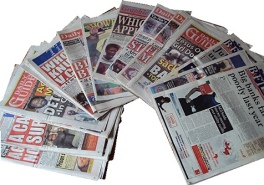
Hear this. “Four hostile newspapers are more to be feared than a thousand bayonets.” This was a statement which Napoleon Bonaparte, the Emperor of France (1769-1821) made.
Those who have studied European history know very well that Napoleon was not a mere emperor who ascended into power through royal lineage. He had to fight his way to the throne, courtesy of his determination and courage. Being one of the most brilliant individuals of his era, a great soldier, a grand strategist and a first-class administrator Napoleon became emperor of France.
Like many other leaders of those centuries, his was the tale of good beginning with bad ending. Despite his earlier accolades, Napoleon towards his reign was regarded as a vicious demagogue.
The statement he uttered “Four hostile newspapers are more to be feared than a thousand bayonets,” teaches one great lesson. All over the world dictators hate free and independent media. If Napoleon was afraid of four newspapers only, it is obvious that a media house which publishes four newspapers, owns a television station, a radio station and a book publishing company can make any modern-day dictator spend sleepless nights.
It is not surprising that in many parts of the world dictators and their minions spend many hours strategising on how to shut-down independent media houses. In the name of the end justifies the means the dictators, use every trick in the book to ensure that any influential independent media is shut-down.
Here in Africa, this is exactly what is happening in the west African nation of Gambia. The country’s dictator Yahya Jammeh – who after attaining power- once challenged the media to “criticise us where we are wrong and contribute where you can contribute,” is now busy shutting down media houses.
His crackdown on the media dates back to 1994 when he promulgated Decree Number 4, which denied Gambians the right to discuss political views and express themselves collectively as members of political parties has now reached its climax. Government through its various agencies is busy conducting raids on the independent private closing down those opposed to Jammeh’s desire to extend his rule using unorthodox means.
It is clear that Jammeh wants to hang onto power and any media house that that does not support his agenda is a candidate for closure. His tactics are not strange at all as other dictators use similar ones. In a piece titled ‘The Dictators Handbook’ Samira Sawlani makes similar observation that dictators ambition to hold on to power “is no easy feat, in fact it is downright exhausting, something all of you who judge and chastise leaders caught with their eyes closed at summits fail to understand.”
“Often it is not sleep, but a state of intense concentration that one is in, ‘meditating’ upon what is being said (listening out for the words ‘aid’, ‘money’, ‘deals’, and what goodies the leader next door has recently obtained) or forming strategies on how to protect (a frankly) ungrateful populace from the agents of Satan that are human rights activists and foreigners who are keen to infect the minds of people with ideas of freedom of expression and democracy (reprehensible).”
Jammeh is not the only leader on this continent whose hatred for free press is disgusting as there are many others some of them masquerading as democrats when in true sense they are despots. These are the type of leaders who hate checks and balances when they are in power and are always uncomfortable when the media is on the forefront in promoting accountability and transparency by among others exposing corruption and malfeasance.
All autocrats including Yahya Jammeh should know that freedom of the press is not a luxury but a currency for any functioning democracy.
